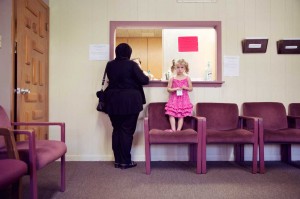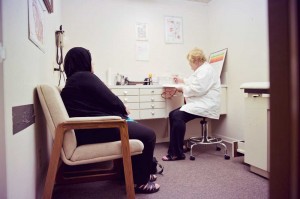Selenat Fanta, the youngest person at the MCC conference table, is a social worker with a master’s degree who grew up in Ethiopia. Her job is to find resources to provide a range of medical and social services. She speaks English and Amharik, an Ethiopian language.

“My work involves becoming familiar with every possible resource in the community that our clients may need,” Fanta said. Social workers know the ins and outs of accessing private and government assistance programs to solve immediate, fundamental needs — housing, healthcare, nutrition, child care. Fanta is adept at handling domestic violence cases. “I started my career at SafeHaven of Tarrant County,” she said.
MCC Program Coordinator Talauna Thompson is an Ohio native who came to North Texas to study at the University of Texas at Arlington. She holds a master’s degree in social work and is responsible for day-to-day management of the organization. She’s a dead ringer for supermodel Tyra Banks, a fact that doesn’t quite jibe with her executive demeanor and ready suggestions during the meeting.
“We serve all of Dallas and Fort Worth, and it’s a challenge to get the word out about what we do,” Thompson said. “I give educational presentations in all sorts of places where we know there are people who need help.” The MCC uses Funasia, a South Asian ethnic radio station, to announce events and programs.
Thompson makes informal speeches at area mosques. “We get a lot of calls after each program,” she said –– potential volunteers, potential clients, women who call to talk about domestic abuse. “Women will say, ‘This is happening to me,’ or tell me it is happening to their daughters,” she said.
Salem, the liaison to Baitulmaal, grew up in Southwest Fort Worth, the daughter of an Egyptian immigrant father and a seventh-generation Texan mother. She says she has “two sides of my identity,” with Muslim family on her father’s side and Protestant relatives on her mother’s. Her mother converted to Islam when she married.
She said the wide differences in culture among the refugees can make aid work more difficult. “You have a very diverse Muslim community here. There is diverse ethnicity, culture, age groups, and nationalities,” she said. So there is no single solution, she said, no one-size-fits-all remedy. “That’s what is especially challenging for the aid groups. Every issue we tackle is brand-new.”
Ahmed said the MCC provides services for Muslims in a cultural context. It’s not about religion. “I tell people to go to the mosque to talk about religion,” he said. “Here we are concerned with the physical and mental health and well-being of people.”
********
MCC is seeing a growing number of women clients who are dealing with domestic violence, Ahmed said, so the staff has increased efforts to network with nine women’s shelters in the Metroplex, as well as with local law enforcement.

“We just received a federal grant for three years to train volunteers to identify and help women in our community,” Ahmed said. A big part of his work involves securing grants and other fund-raising activities to keep the clinic and other MCC activities going.
“Domestic violence is an issue among women, period,” Salem said. “The problem in the Muslim community is it’s not really talked about. I think it’s all of a sudden a hot topic because it hasn’t been talked about or dealt with.”
Nehu Almakhzoumi works as the center’s outreach coordinator and specializes in finding help for women suffering from domestic violence. A native of Jordan, Almakhzoumi is fluent in English and Arabic. She takes MCC’s message to the streets, visiting Muslim women who are reluctant to share their domestic-violence situations. And she reaches out to law enforcement, offering sensitivity training about the Muslim culture. When there is a referral about a situation of family violence, Almakhzoumi goes to the home or meets the woman in a private place.
“In the Muslim community, it’s not so obvious that a woman is being hurt by her husband,” she said. “We do not see bruises or black eyes, for example. What we see most often are broken fingers or broken toes.” There is a tendency in Muslim families to tolerate abuse, she said.
“They don’t think they can leave,” Almakhzoumi said. “In the immigrant community, there is rarely any type of extended family support, because the rest of the family may not be here.” Adding to the difficulties are language barriers. “These women don’t know whom to call if they can’t speak English, and they are very frightened,” she said.
“Very soon after these refugees come in, the domestic violence numbers go very high very fast,” she said. The stranger-in-a-strange-land dynamic exacerbates marital and family stress. “These women are asking why the husband has brought them here, how they are expected to function before they learn to speak English, and, in fact, how are they going to learn?” she said. “They are very torn. If they talk with their families on Skype, they are implored to return, to bring the kids back. It’s not a good situation.”
Salem said issues of family violence are cultural rather than religious. “Religiously, it’s not allowed for men to beat up their wives,” she said. “It is sometimes a cultural norm, though. That’s a clash of two worlds.”
********












The English Engine
http://www.the-english-engine.com